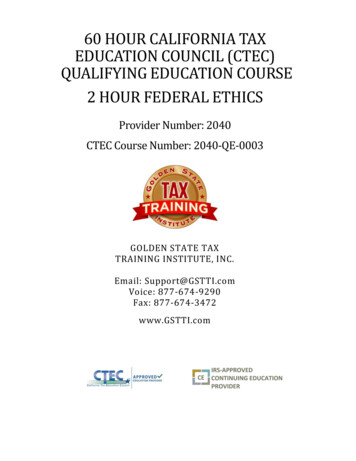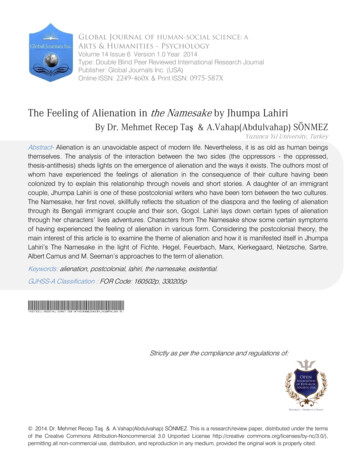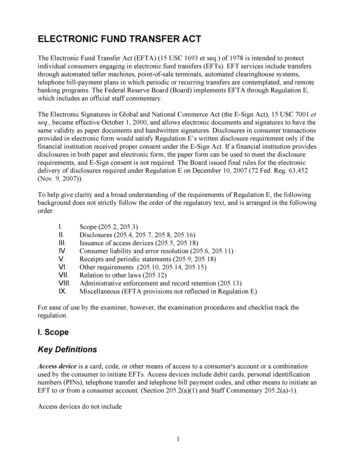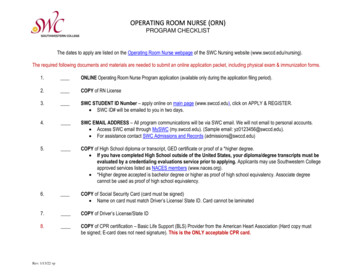
Transcription
60 HOUR CALIFORNIA TAXEDUCATION COUNCIL (CTEC)QUALIFYING EDUCATION COURSE2 HOUR FEDERAL ETHICSProvider Number: 2040CTEC Course Number: 2040-QE-0003GOLDEN STATE TAXTRAINING INSTITUTE, INC.Email: Support@GSTTI.comVoice: 877-674-9290Fax: 877-674-3472www.GSTTI.com
EXCLUSIVEPUBLISHERS OF THISLIMITED EDITIONALL RIGHTS RESERVED, NO PART OF THIS PUBLICATION MAY BE REPRODUCED, STORED IN ARETRIEVAL SYSTEM, OR TRANSMITTED, IN ANY FORM OR BY ANY MEANS, ELECTRONIC, MECHANICAL,PHOTOCOPYING, RECORDING, OR OTHERWISE, WITHOUT WRITTEN PERMISSION OF THE PUBLISHER .This material is for educational purposes only and specific to the subject matter contained in the Table of Contents, and in noway does it cover all aspects of the tax code. Rather, it is constructed to offer an accurate representation of the subject matterbeing covered. Purchase of this course or any other course offered by Golden State Tax Training Institute, Inc. comes with theprovision that they are not for the purposes of offering legal or other professional services. Additionally, the course contains thecurrent tax law as to date of publication. Any important tax law changes will be sent to students in the form of a supplement.ARTICLES AND COMMENTARY INCLUDED HEREIN DO NOT CONSTITUTE AN OPINION AND ARE NOT INTENDED OR WRITTEN TOBE USED, AND THEY CANNOT BE USED, BY ANY TAXPAYER FOR THE PURPOSE OF AVOIDING PENALTIES THAT MAY BE IMPOSEDON THE TAXPAYER.Copyright is not claimed in any material secured from official U.S. government publications or circulars. 2021 Golden State Tax Training Institute, Inc. All Rights Reserved.
Table of ContentsIntroduction . iiCourse Description . iiCourse Learning Objectives . iiCTEC Registration Requirements . vCalifornia Legislation Changes CTEC Requirements for CRTPs . viiFederal Ethics, Professional Responsibilities, Penalties . 1-1Practice Before the IRS . 1-2Sarbanes-Oxley Act of 2002. 1-7Rules for Tax Preparers – Circular 230 . 1-7Subpart A . 1-9Subpart B . 1-18Subpart C. 1-24Subpart D. 1-26Subpart E . 1-29Individual Income Tax Penalties . 1-30Tax Return Preparer Penalties . 1-31Paid Preparer’s Due Diligence Checklist. 1-32Additional Tax Return Preparer Penalties . 1-35Review . 1-38Review Questions . 1-38Review Feedback . 1-40Bibliography .IIndex .IIExamination Instructions - 2 Hour Federal Ethics . EX-1Examination Questions - 2 Hour Federal Ethics . EX-2Lesson 1 . EX- 2Course Evaluation . CE-1CP36 - Provider Notification to New Preparers . CP-1 2021 Golden State Tax Training Institute, Inc.i
IntroductionThank you for choosing Golden State Tax Training Institute, Inc. This basic self-study 60 hour Qualifying Education (QE)course is approved by the California Tax Education Council (CTEC). This section contains 2 hours of Federal Ethics andcan be done at your own pace. Successful completion of the full 60-Hour QE course will enable you to register with CTECas a California Registered Tax Preparer (CRTP) and prepare taxes within the State of California. We know your time isimportant to you, so we have produced the most comprehensive and innovative tax education products on the markettoday. We focus on customer service and satisfaction, and we strive to look for new and responsive ways to make earningyour CTEC qualifying education requirements as convenient as possible.Since this is a self-study course, you can complete it at your own pace and on your own schedule. The minimum passingrequirement is 70% on the examination questions at the end of the material. The exam has no time limit and is open book,so you are allowed to look up answers in the text we provide. You do not need to finish the exam in one continuous sittingas all of the answers you enter online are automatically saved. After you submit the exam to us, we will grade it and, uponsuccessful completion, e-mail you a Certificate of Completion. Additionally, we notify the California Tax Education Council(CTEC) that you passed the Qualifying Education (QE) allowing you to apply for your CRTP registration.If you should fail the exam on your first attempt, you will have the option to re-take the exam at no additional charge. Youhave unlimited attempts to pass an exam.Course DescriptionThis 2-Hour Federal Ethics section focuses on Federal tax preparer ethics and responsibilities. The course highlightsprincipals of professional conduct that are of significant importance to a tax practitioner. Among other topics, this courseincludes information about the requirements of practice before the IRS including power of attorney, rules for tax preparers(Circular 230) and tax return preparer penalties.Please Note: Due to the major tax reforms implemented by the Tax Cuts and Jobs Act, the IRS recommends studentswatch for additional IRS guidance as the year progresses and the 2020 filing season approaches. The IRS alsorecommends students do the appropriate research as they encounter issues affected by the Tax Cuts and Jobs Act. Thisspecifically applies to the pass-through deduction for qualified trade or business. Please review the IRS Tax Reformwebpage located at https://www.irs.gov/newsroom/tax-reform for updated guidance and the most current information.This section includes a table of contents and comprehensive index to help guide your search for specific topics.Additionally, if you are using the electronic version of the course, you can use the word search function by pressing “CTRL F” on your keyboard and entering the word(s) you would like to look up. Along with the extensive course content, youwill also find a bibliography you can use to find additional reference material when searching for particular topics oranswers to review and examination questions. The numbers in parentheses at the end of a sentence correspond to thenumbers in the bibliography.Completion Deadline & Exam: This California Tax Education Council (CTEC) course must be completed within one yearof the date of purchase.Course Level: This basic course is appropriate for individuals interested in becoming a California Registered TaxPreparer (CRTP).CTEC QE Credits: 2 HoursCategory: Federal EthicsPrerequisite: NoneAdvanced Preparation: NoneCourse Learning Objectives1. Identify important aspects of practice before the IRS including power of attorney and confidentiality privileges.2. Recognize the framework for using the rules of Circular 230, along with the terminology used by the circular andits applicability to each tax practitioner.3. Distinguish tax preparer penalties and the varying sanctionable acts that trigger practitioner discipline. 2021 Golden State Tax Training Institute, Inc.ii
IntroductionReview Questions and FeedbackAt the end of each lesson there are several review questions that are designed to help you learn the material you havejust studied. Review questions are for instructional use only and you will not be graded on these questions. We provideboth the answers to each question and an explanation or feedback as to how we arrived at each answer at the end of thelesson.Best practice suggests that you should try to answer these questions on your own first, and only then refer to the answerkey and feedback to see how well you did in terms of learning the material. As with all self-study CPE courses, you canrefer back to the course material to locate the answers - the so called 'open book' learning method is permissible.Final ExaminationThe final examination is intended to test your overall comprehension of the course. Each question will relate to topicsfound throughout the course so all of the answers can be found in the material. Passing the final examination from a selfstudy course is contingent upon scoring 70% or higher on the exam questions related to the course material. Theexamination consists of 10 multiple-choice questions, meaning you must correctly answer 7 in order to pass.How To Submit The Online Examination: Log into www.GSTTI.com.Enter your email address and your password.Click link to take online exam.Answer questions (There is no time limit).Submit answers (The exam does not need to be completed in one sitting).Get certificate by email within 24 hours.We electronically notify CTEC that you earned Qualifying Education (QE) course credits.The exam has no time limit, and is open book, so you are allowed to look up answers in the text we provide. You do notneed to finish the exam in one continuous sitting as all of the answers you enter online are automatically saved. After yousubmit the online exam to us you will receive a pass/fail message.If you should fail the exam on your first attempt, you will have the option to re-take the exam at no additional cost. If youscore less than 70%, a message will be displayed at the bottom of the page along with a list of incorrect questions. Youhave unlimited attempts to pass an exam.Upon successful completion of the full 60-Hour QE course, we will e-mail you a Certificate of Completion. Additionally, wenotify the California Tax Education Council (CTEC) that you passed the Qualifying Education (QE) allowing you to applyfor your CRTP registration online at www.CTEC.org.You must register with CTEC within 18 months from the completion date on the certificate of completion. Informationregarding registration can be found at www.CTEC.org. You must also have proof of a 5,000 tax preparer insurance bondwhich can be obtained from any number of bond companies for about 15 - 25 per year.After your initial registration, you must complete 20 hours of continuing education each year and register with CTEC byOctober 31st. There is a late registration period from November 1st to January 15th, but you will have to pay CTEC a lateregistration fee during this period. Golden State Tax Training has a 20-Hour CTEC approved continuing professionaleducation course that you can take each year to meet this requirement. Lastly, you must obtain a preparer tax identificationnumber (PTIN) from the IRS (www.irs.gov/ptin). You must renew your PTIN with the IRS at the end of every year if youplan to prepare taxes the following year.We wish you every success and thank you for choosing Golden State Tax Training Institute, Inc. 2021 Golden State Tax Training Institute, Inc.iii
IntroductionUnderstanding the Icons Used in this BookImportant: Update or changeTip: Significant informationNote: Additional informationReview Question: Learning opportunityGolden State Tax Training Institute, Inc. is an approved education provider for the California Tax Education Council(CTEC) and the Internal Revenue Service (IRS). Our CTEC provider number is 2040 and can be verified atwww.CTEC.org. Our IRS provider number is P619F and can be verified on the IRS list of Approved Continuing EducationProviders. 2021 Golden State Tax Training Institute, Inc.iv
IntroductionCTEC Registration RequirementsIMPORTANT: Just because you successfully completed the 60-hour qualifying education (QE) course does not mean youcan prepare tax returns in the state of California. You must also complete the registration process with the California TaxEducation Council (CTEC). Carefully read the instructions below to complete that process.You have 18 months from the completion date listed on the 60-hour qualifying education (QE) completion certificateprovided by Golden State Tax Training Institute to register with CTEC. If you do not register with CTEC within the allowed18 months, you will be required to complete another 60-hour qualifying education course before being able to register.CTEC registration MUST be completed online at https://www.ctec.org/tax-professionals. You will need the following tocomplete your registration: An online application for new preparers; a background check and fingerprinting procedure(Live Scan); a 5,000 tax preparer bond; a valid IRS PTIN; and payment of registration fee of 33 with a Visa, MasterCard or Debit card.You have two registration options:1. CAUTION - If you register as a new preparer before November 1 – you are registering for the cycle year endingon October 31 of that year. Example: If you register as a new preparer on October 15, 2020, that registration isonly valid thru October 31, 2020. You would be required to take another 20 hours of continuing educationsometime between October 15, 2020 and October 31, 2020 to renew your registration for the next registrationcycle.2. If you register as a new preparer after October 31 – you are registering for the next cycle year beginning November1 of the current year and ending on October 31 of next year. Example: If you register as a new preparer onNovember 2, 2020, your registration is valid thru October 31, 2021. From November 2, 2020 thru October 31,2021, you will be required to take 20 hours of continuing education from a CTEC approved provider in order tomeet the renewal requirements for the next registration cycle, which will begin on November 1, 2021.Education providers do not register students with CTEC, it is up to you to take the final step and complete the registrationprocess.CTEC Application Process for New PreparersStep 1 - Complete Online Application for New Preparers - Visit https://ctec.org/App/Preparer/NewApplication/index andclick the link to begin your Online Application. You will be required to enter your personal information, complete a backgroundquestionnaire, and create your login account.NOTE: You have the option to start your required 60-Hour Qualifying Education (QE) Course before beginning the OnlineApplication; however, if you take the 60-Hour QE Course but do NOT pass the new CTEC requirements of a backgroundcheck and fingerprinting procedure (Live Scan), you will not be able to register with CTEC.Step 2 - Complete Live Scan Process - CTEC now requires all new applicants to pass a background check and fingerprintingprocedure (Live Scan) in order to become registered with CTEC. Login to your account, which you created in STEP 1, usingthe link below to access Live Scan forms and find Live Scan locations near you. Take the Live Scan form with you to yournearest Live Scan location.NOTE: Your application will remain “Pending” until CTEC receives your Live Scan report from the California Department ofJustice. This process could take several weeks or several months.Step 3 - CTEC Notification of Live Scan Approval or Denial - CTEC Live Scan reviewers will receive and review reportsfrom the California Department of Justice. Either an approval or denial notification will be sent to the applicant. If approved, thenotification will be sent via email. If denied, the notification will be sent via USPS. If approved, the applicant can then continuewith the registration process below. If denied, the process to appeal will be outlined in the denial letter. 2021 Golden State Tax Training Institute, Inc.v
IntroductionCTEC Registration ProcessStep 1 - Take a 60-Hour Qualifying Education (QE) Course from a CTEC Approved Provider - Complete the required60-Hour Qualifying Education (QE) Course from Golden State Tax Training Institute, Inc., a CTEC Approved Provider.Step 2 - Obtain a Personal Tax Identification Number (PTIN) from the IRS - Go to IRS.gov/tax-professionals to applyfor a Personal Tax Identification Number (PTIN). You are required to have this number for CTEC registration.Step 3 - Purchase a Tax Preparer Surety Bond - As required by law, you must purchase a 5,000 Tax Preparer SuretyBond from a surety bond company in order to register with CTEC. Use the Internet to search for surety bond companies.Once you receive the bond, you will need to upload a copy of that bond to your CTEC account. You will find directions onthe uploading process once you are in your account.Step 4 - Complete Online CTEC Registration and Submit Payment - Once you have completed your 60-hour QEcourse from your CTEC approved provider, received your PTIN number from the IRS, and received your 5,000 taxpreparer surety bond, you will need to complete the online CTEC registration process. As part of the final process, CTECallows you to select either the current or subsequent cycle year. Visit ctec.org/App/Preparer/Login to access your CTECaccount and finalize your registration.As a reminder, education providers do not register students with CTEC, it is up to you to take the final step and completethe registration process.Important InformationThe following items are important registration topics to remember: The CTEC cycle year registration period runs from November 1st to October 31st of the following year.Renewal registration opens August 1st and ends October 31st.After your initial registration, you must complete 20 hours of continuing education annually from a CTEC approvedprovider and renew your registration with CTEC by October 31st each year.There is a late renewal period that runs from November 1st through January 15th of the following year. If you renewduring that time period, a late registration fee will apply. Remember, you are not permitted to prepare taxes duringthis late renewal registration period.If you fail to renew by January 15th of any given year, you will be required to retake the 60-hour qualifying educationcourse from a CTEC approved provider; complete an online application for new preparers; complete a backgroundcheck and fingerprinting procedure (Live Scan); have a 5,000 tax preparer bond; have a valid IRS PTIN; and,register as a new preparer. 2021 Golden State Tax Training Institute, Inc.vi
IntroductionCalifornia Legislation Changes CTEC Requirements for CRTPsCalifornia Assembly Bill 3143 was signed into law in September 2018 with new provisions and requirements that willextend the CTEC program until January 1, 2023. The renamed Tax Preparation Act (California Business and ProfessionsCode Section 22250-22259) stipulates revisions that will impact CTEC Registered Tax Preparers (CRTPs).CRTPs Must Provide CTEC’s Website to ClientsAs of January 1, 2019, CRTPs, prior to rendering any tax preparation services, shall provide their customer, in writing,with the following:1. The tax preparer’s name, address, and telephone number.2. Evidence of compliance with the bonding requirement, including the name of your bond company, the bondnumber, the bond effective date an expiration date.3. The address of the CTEC website, www.ctec.org.Upload a Copy of a Valid Tax Preparer BondCTEC registration now requires an individual to upload a copy of a valid tax preparer bond when registering or renewing.The bond policy must include the following: Tax preparer’s name.The name of the surety bond company.Bond policy number.Bond effective date.Bond expiration date.Disciplinary Actions Against CRTPs Made PublicAs of July 1, 2019, CTEC will post the following on its website: All disciplinary actions taken against registrants by the Council, including, but not limited to, misconduct thatresulted in a suspension or revocation of a CRTP registration.A list of registrants on probation, including the misconduct that resulted in the probation and any terms ofprobation.A notice of the paid surety bond claims.Reporting Bond ClaimsOn or after July 1, 2019, a CRTP is required to report all paid claims against their surety bond to CTEC. CTEC is alsorequired to post a notice of the paid surety bond claims on ctec.org.Background Checks and Fingerprint ImagesEffective July 1, 2020, California Business & Professions Code Section 22251.3 was amended to require new applicantsinterested in becoming CRTPs to pass a criminal background check and submit fingerprint images to CTEC to determinean individual’s eligibility to register as a CRTP. The new requirements are NOT applicable to current CRTPs, only newapplicants who register on or after July 1, 2020.Also beginning July 1, 2020, if a CRTP allows their CTEC registration to expire and they would like to reregister withCTEC, they not only will be required to retake the 60-hour qualifying education (QE) course, but they will also be requiredto go through a background check and resubmit fingerprint images to CTEC.California Consumer Privacy ActEffective January 1, 2020, the California Consumer Privacy Act, or CCPA, will go into effect. The new law, which theCalifornia Attorney General will begin to enforce on July 1, 2020, requires any business that collects or stores the personalinformation of California residents, regardless of where the business is located, must comply with the CCPA. This bill gives 2021 Golden State Tax Training Institute, Inc.vii
Introductiona consumer the right to control what a business does with the personal information that has been collected about theconsumer.Under the CCPA, a consumer must file a verifiable request to obtain information from a business or request that a businesshandle the consumer’s personal information in a certain way. The request must be verifiable; the business must be ableto verify the requestor’s identity.Under the CCPA, among other items, a consumer may request: To know the categories of a consumer’s personal information that the business collects.To know the specific items of a consumer’s personal information that the business has collected.To know the business purpose for the collection of the consumer’s personal information.That their personal information is not sold.That their personal information be deleted.Under the CCPA, a business has 45 days to respond to a request with the opportunity to get additional time. For moreinformation, visit the California Attorney General’s website at oag.ca.gov/privacy/ccpa. 2021 Golden State Tax Training Institute, Inc.viii
Federal Ethics, Professional Responsibilities, PenaltiesAt the conclusion of this lesson you should have a basic knowledge of: Treasury Department Circular 230.Office of Professional Responsibility.Current Continuing Professional Education Requirements.Paid Tax Preparer Penalties.Federal tax law starts with the Internal Revenue Code (IRC), enacted by Congress in Title 26 of the United States Code(26 U.S.C.). Formally called the Internal Revenue Code of 1986, the IRC is the domestic portion of Federal statutory taxlaw in the United States. It is organized topically, into subtitles and sections, covering income tax, payroll taxes, estatetaxes, gift taxes, and excise taxes; as well as procedure and administration. Treasury regulations (26 C.F.R.), also referredto as Federal tax regulations, begin where the Internal Revenue Code (IRC) leaves off by providing the officialinterpretation of the IRC by the U.S. Department of the Treasury.Revenue Rulings are public administrative rulings by the Internal Revenue Service (IRS) in the United States Departmentof the Treasury of the United States Federal government that apply the law to particular factual situations. A RevenueRuling can be relied upon as precedent by all taxpayers.The Office of Professional Responsibility (OPR) and the Return Preparer Office (RPO) generally are responsible foradministering and enforcing the regulations governing practice before the IRS. The OPR supports the IRS’s strategy toenhance enforcement of the tax law by ensuring that tax professionals adhere to tax practice standards and follow thelaw. The OPR is the governing body responsible for interpreting and applying the Regulations Governing Practice beforethe Internal Revenue Service (Treasury Department Circular 230). The OPR has exclusive responsibility for practitionerconduct and discipline, including instituting disciplinary proceedings and pursuing sanctions. It functions independently ofthe Title 26 enforcement components of the IRS. The Return Preparer Office (RPO) is responsible for matters related tothe authority to practice, including acting on applications for enrollment and administering competency testing andcontinuing professional education.OPR continuously investigates cases involving tax professionals not in compliance with their ethical obligations. Recently,OPR disbarred a former CPA and former attorney in Massachusetts. He was disbarred for having his CPA license revokedand for falsely claiming to be a CPA on power of attorney forms submitted to the IRS. In an Initial Decision and Order, theALJ determined that Edgar’s “conduct demonstrates he does not have the integrity or character to be trusted representingtaxpayers before the IRS.” The Decision further stated: “The only appropriate sanction therefore is disbarment.” TheTreasury Appellate Authority concurred finding the disciplinary proceeding was brought within the statute of limitations;that Edgar had given false and misleading information to a Treasury employee during the IRS examination process; and,that submitting false powers of attorney to the IRS was a “serious violation[s] that warrants a severe sanction.” (1)Also, an Enrolled Agent (EA) was disbarred for stealing a client's tax payments and for preparing tax returns with falsedeductions for multiple clients. In a Final Agency Decision, the Administrative Law Judge disbarred the EA formisappropriating client payments intended for the IRS in furtherance of an offer in compromise, and for preparing multiplereturns containing Schedule C deductions for which she could not produce substantiation on audit. The EA was engagedto represent a taxpayer in a collection matter. The client gave the EA two money orders totaling 1,500 to forward to theIRS along with an offer in compromise for delinquent taxes. It was found by the ALJ that the EA altered, endorsed andcashed the money orders for her own personal use, which are acts of willful incompetent and disreputable conduct underCircular 230.The ALJ also found that the EA prepared Form 1040 for seven clients claiming Schedule C deductions that wereunsubstantiated and unsupportable. It was found that the EA failed to exercise due diligence in preparing the ScheduleC’s, thereby violating multiple due diligence provisions contained in Circular 230. The EA also failed to respond to theadministrative complaint and the motion for default judgment. The ALJ de
Please Note: Due to the major tax reforms implemented by the Tax Cuts and Jobs Act, the IRS recommends students watch for additional IRS guidance as the year progresses and the 2020 filing season approaches. The IRS also recommends students do the appropriate research as they encounter issues affected by the Tax Cuts and Jobs Act.










